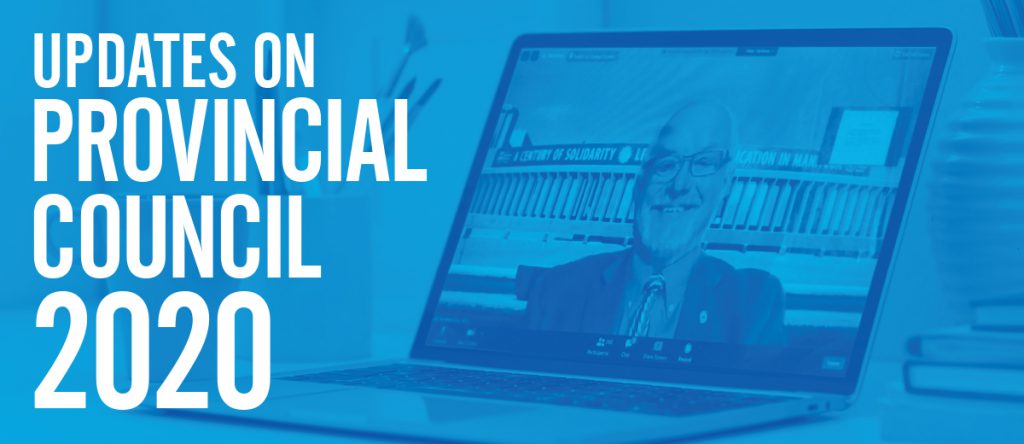
May 22, 2020
Minister speaks to AGM
 Education Minister Kelvin Goertzen zoomed in from his home office in Steinbach, MB, to bring greetings to the 333 delegates attending the 101st annual general meeting of The Manitoba Teachers’ Society.
Education Minister Kelvin Goertzen zoomed in from his home office in Steinbach, MB, to bring greetings to the 333 delegates attending the 101st annual general meeting of The Manitoba Teachers’ Society.
The minister’s attendance at the annual meeting was well timed as it gave him the opportunity to address some of the top of mind issues arising from the province’s recent announcement about the return to school.
Yesterday the province announced that as of June 1, schools across the province will be opened for limited use. This allows for things such as one-on-one assessment, planning for the upcoming school year and giving students access to the internet. The minister was clear that this is not a return to in-class instruction, and recognizes that this element further adds to the workload of teachers.
“With in class assessments, preparing for a return in September and then doing at home learning instructions, that’s a lot to take on,” he said. “We’ve given a little discretion there. We haven’t set hard dates within June, other than learning is going to continue we’re giving teachers the discretion in terms of how that might happen.”
The minister then spoke about the province’s proposal to start school on August 31, as a way to help minimize learning loss and help with the transition back to in-class instruction.
“Summer is precious all the time in Manitoba for obvious reasons, but particularly this year,” he said. “It is really important to have as much of that summer as possible, balanced with the reality that we’ve lost a lot of learning for many students.”
He said that some students have done well with remote learning, while others have struggled.
“We need to find additional days to help those students who need remedial learning to catch up,” he said. “So we are having that dialogue and we’re having that discussion and we’ll see if there are other suggestions that are better than the ones that have been put forward.”
The minister acknowledged that, “we may not be able to make every student whole in one year, in terms of that learning loss.”
Looking ahead, he said that there have been many questions about the upcoming school year.
“We are fully committed to coming back in the new school year this fall,” he said. “We want our kids to be back, but we want it to be done safely. We will be taking the advice of public health.”
He said that while safety is paramount, it is important that the return to school is not done “artificially”.
“There is a risk to creating such an artificial environment for kids that it has a negative social or personal effect on them,” he said. “We want schools to be as normal as possible. We’re all going to be trying to find that balance together, as teachers, as family members, parents and of course as medical folks, but that’s the task that we have.”
New members of provincial executive
There will be three new faces on the MTS provincial executive after a vote by delegates to the 101st Annual General Meeting of the Provincial Council.
There were six positions open for members-at large.
Newly elected were:
- Joel Swaan, Garden Valley
- Kristen Fallis, Winnipeg
- Cathy Pellizzaro, Thompson
Re-elected were:
- Catherine Hart, Seven Oaks
- Chris Darazsi, River East Transcona
- Kerry Enns, Border Land
New fee approved
Delegates to the MTS Annual General Meeting approved a new budget, including a slight fee increase.
The annual fee for full members will go to $1,042 from $1,012.
President address AGM
The following are excerpts from President James Bedford’s address to the virtual MTS AGM, held Friday, May 22.
The pathway that brought us here today has not been an easy one to travel, but perhaps a few words that will help us understand the decision making process.
We have been guided throughout by three underlying principles. The first is the observance of the law, the Emergency Measures Act that limits gatherings within the province.
Secondly, we have tried for the best part to preserve the intent of our Bylaws; not every word, but the spirit of those words, in the actions that we have taken.
And lastly, but I think first and foremost in our decision making, was to ensure the physical and mental health of you, delegates and members of the Society. None of the work that we do is more important than our health.
I recognize that today’s meeting is far from what is normal. I liken it to our classrooms. Our members are doing outstanding work doing Emergency Remote Teaching and Learning, but underlying all that they do is the proof that the most effective classroom is the real one, with teachers and students together within the same room.
It has been on the advice of our valued legal counsel that we are doing the essential business of the Society today, approving our budget and setting our fee, and having the opportunity to elect members-at-large to the Provincial Executive so governance will continue.
And the essential work of the Society has been going on diligently this past year, and especially these past months. As you are well aware, the Minister has delayed the release of the K-12 Education Review Commission recommendations. The Minister has confirmed that we shall see no implementation of recommendations until next summer at the earliest. The Minister has also stated that legislation to move us to provincial bargaining will come after the release of those recommendations, so we continue to wait.
But we have not been idle, as the recent Louis Riel Arbitration award has shown. I know that you join with me in thanking our staff and the leadership of the Louis Riel Teachers’ Association for their hard work back in the fall. And we wish our colleagues in the Pembina Trails Teachers’ Association well on their arbitration.
Turning now to the past two months, I want to acknowledge the work of staff and leaders throughout the Society. At the end of March, just as all of you were asked to do something that you have never done before, the General Secretary asked the same of staff.
Over the course of a week we were able to ensure that technology and training were in place to ensure that members, in what is perhaps one of the most critical times in public education in our 100 year history, would continue to be supported by their Society.
Not only has the work continued without interruption, but the scale of much of that work has exceeded by far previous records. Visits to our website, calls to staff, social media postings and requests for interviews have exceeded previous totals. It has been clear to me that in this, an information age, the primary goal must be to inform members, and the public, in the most timely and efficient means possible. Not only do we have the tools to do that, but more importantly we have the people to do that. For those of you who are local leaders, I know that you have turned to the Society for support, and I urge you to continue to do that.
For me, one of the outcomes of this pandemic crisis has been building a positive relationship with the Minster of Education. Regular phones calls, at times without an established agenda other than an opportunity to check in, have been much appreciated.
We have had the opportunity to raise issues of concerns as well as pass along information. The establishment of the Response Planning Team under the direction of Assistant, now Acting Deputy Minister, Rudy has been productive in bringing education partners to a single table to address a multitude of issues, not least of which have been June report cards and recovery learning in the fall.
As the work of leadership is all about building positive relationships, those phone conversations shall continue until they can again be in person conversations. We shall maintain the positive and constructive relationship with the Minister when the Education Review recommendations are finally released.
